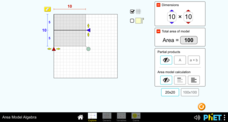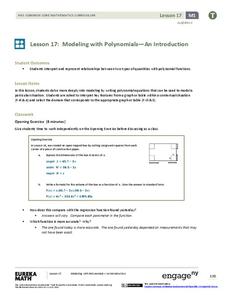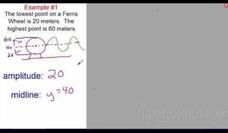Star Date
Solar System Scale Model Demonstration
Explore outer space and decorate your classroom with an astronomy project. Learners create a visual model with the creation of a scaled solar system using different sized balls.
Journey Through the Universe
The Voyage Scale Model Solar System
Young scientists learn how to select a scale factor for a large scale model. Then they figure the scale for each of the planets and the distance between them. Finally, they construct a giant scale model of the solar system and answer...
PHET
Area Model Introduction
Provide two views of multiplication. The introduction to an area model application has two modes. One mode shows the area of simple multiplication up to 12 by 12. The second mode shows how area models can be partitioned leading to the...
PHET
Area Model Algebra
Expand the pupils knowledge of using area models to algebra. The interactive allows learners to use the same procedure of getting partial products when multiplying multi-digit numbers to multiplying polynomials. Scholars see how the...
Flipped Math
Modeling with Graphs
Create a graph for anything in the world. Pupils continue to work with graphs that model situations. The learners analyze different graphs to answer questions about the scenario along with finding equations of graphs. Scholars use...
EngageNY
Interpreting Division of a Fraction by a Whole Number—Visual Models
Divide fractions just like a model does. Pupils visualize the division of a fraction by a whole number by creating models. Scholars make the connection between dividing by a whole number and multiplication before practicing the skill...
Virginia Department of Education
Modeling Division of Fractions
Provide a meaningful context for learning about the division of fractions with this upper-elementary math lesson. Presented with a simple, real-world problem, young mathematicians work in small groups to develop visual models...
EngageNY
Modeling with Polynomials—An Introduction (part 2)
Linear, quadratic, and now cubic functions can model real-life patterns. High schoolers create cubic regression equations to model different scenarios. They then use the regression equations to make predictions.
Education Development Center
Area Model Factoring
Introduce learners to what factoring represents and it's relationship to a square with a resource about factoring and the method of area models. The questions are scaffolded to begin with introductory questions and eventually have...
Museum of Tolerance
Family Role Model Activity
What does is take to be a role model? Through grand conversation, and the use of books and a graphic organizer, scholars find out and apply the requirements to identify a role model within their family. They then journey through the...
West Contra Costa Unified School District
The Power of Ten: Building a Magnitude Model
Add visual representation to teaching place value with a magnitude model. Using adding machine tape, pupils build a linear place value strip from 1 to 100.
Rational Number Project
Initial Fraction Ideas Lesson 9 Overview
Visual models support young mathematicians with exploring equivalent fractions. Starting with a quick warm-up problem, children go on to work through a series of guiding practice problems before working with a partner identifying and...
EngageNY
Modeling a Context from a Graph
Collaborative pairs develop functions that model a graph from a context using the modeling cycle. They then analyze their function models in order to answer questions about the scenario.
Texas Education Agency (TEA)
Architecture Letter Model
Using an engaging resource, scholars learn about model-building with direct instruction and discussion. They build an architectural model of a chosen letter from the alphabet, and then present their work to the class.
Flipped Math
Calculus AB/BC - Exponential Models with Differential Equations
Exponential models come with a shortcut. Pupils watch an example of how to determine if a differential equation is an exponential model. Learners realize the solution is in the same formula, allowing for a quick way to determine the...
Flipped Math
Modeling with Trig Functions
Find out what to do with Ferris wheels that keep going up and down. Individuals learn how to determine the frequency of a trigonometric function. Pupils use their knowledge of trigonometric functions to model periodic motions like Ferris...
NASA
Using Models in Climate Change Research
Explore models through the relevant lens of climate change! Investigators watch a video about using models and their application for evaluating temperature data and climate change. Scientists read an article on climate change and answer...
Illustrative Mathematics
Fractions and Rectangles
Visual models are excellent teaching tools when explaining equivalent fractions. Looking at a rectangle cut into twelfths, learners first identify the shaded fraction, and then explain whether the fraction is equal to one-fourth....
PHET
Area Model Decimals
Area works with decimals too. Pupils use the interactive to model multiplication of two decimals using an area model. They see how the decomposed components of the factors obtain partial products and then the complete product. Using area...
Flipped Math
Modeling with Quadratics
Do some interpretive modeling. Class members watch three examples of interpreting key features of a graph of a quadratic to find solutions to a real-world problem. Learners review how to find the key features on a graph using technology...
Anti-Defamation League
Role Models and Stereotypes: Misty Copeland's Story
A lesson points the spotlight at Misty Copeland, the first African American Principal Dancer. A thoughtful discussion prompts pupils to think of their career aspirations and identify ways role models and stereotypes influence young...
EngageNY
Modeling a Context from Data (part 2)
Forgive me, I regress. Building upon previous modeling activities, the class examines models using the regression function on a graphing calculator. They use the modeling process to interpret the context and to make predictions...
EngageNY
Modeling Riverbeds with Polynomials (part 2)
Examine the power of technology while modeling with polynomial functions. Using the website wolfram alpha, learners develop a polynomial function to model the shape of a riverbed. Ultimately, they determine the flow rate through the river.
EngageNY
Interpreting Division of a Whole Number by a Fraction—Visual Models
Connect division with multiplication through the use of models. Groups solve problems involving the division of a whole number by a fraction using models. The groups share their methods along with the corresponding division and...
Other popular searches
- Clay Modeling
- Modeling Plate Tectonics
- Visual Math Vocabulary
- Computer Modeling
- Modeling Division
- Modeling Quadratic Functions
- Linear Modeling
- Modeling Dna Structure
- Modeling Group Work
- Modeling Day and Night
- Modeling Cell Structures
- Modeling Addition Equations























